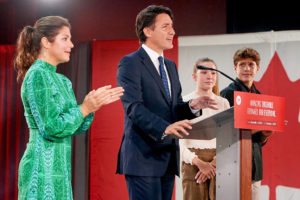Liberal Minority Government Once Again
Trudeau wins a third term but falls short of a majority

The results of the election were as follows, the Liberals got 158 seats, Conservatives have 119 seats, while the BQ got 34 seats and the NDP have 25 seats with the Green getting only 2 seats. To get a majority 170 seats are required.
Talk about a total waste of time and money, we are right back where we were before the call of this election. Trudeau won a third term in this snap election though fell short of regaining the majority he was seeking, forcing him to rely on smaller parties in another fragmented parliament. Trudeau’s Liberal Party was elected or leading in 158 of the 338 seats in the House of Commons, with 99% of the polls reporting. That’s one more seat than he won in the last election in 2019. The main opposition Conservatives, under Erin O’Toole, won 119 seats, two fewer than last time.
For the second straight election, though, the Liberals lost the popular vote to the Conservatives and won only because of strong showing in Toronto, Montreal and other cities. Overall, the result leaves parliament little changed from what it was before Trudeau called the vote – a stable minority that gives the prime minister license to continue pursuing a pre-election big spending agenda that had already received parliamentary backing earlier this year. In addition, Trudeau should easily find support in the legislature to press ahead with new campaign pledges such as raising taxes on financial institutions and imposing stricter emission rules for oil and gas sector.
This reelection of Trudeau points to ongoing heavy fiscal support and some upside bias towards wider deficits in the medium term. Other initiatives expected to be brought forward quickly include new regulations that will compel media stream services and social platforms like Netflix and TikTok to finance and promote Canadian content. Trudeau had introduced a bill to regulate the sector in the previous parliament that never won passage through the Senate before the election was called.
The Liberal victory is a historic milestone for Trudeau, marking only the eighth time a Canadian leader has won three successive elections, Trudeau’s father, also did it. It also represents a comeback of sorts for Trudeau, whose party was trailing in the polls midway through the five-week campaign. But the outcome is also rebuke of Trudeau’s decision to call a snap election that many Canadians saw as a power grab while the COVID-19 pandemic still rages. With more than 90% of polls reporting, the Liberals had just 32.2% of the national vote. That would be the lowest share for any governing party in the nation’s history. The Conservatives stood at 34%.
This is the second time voters have denied this prime minister full control of the legislature, limiting his freedom to take big risks or govern unilaterally. The results reflect a nation that’s unsure about its immediate future amid fourth wave of the pandemic. Canadians are dealing with growing debt levels and concerned about a future transition from an oil-producing nation to a low-carbon economy.
Like in 2019, when Trudeau lost his majority, the outcome also underscores the regional divisions facing the nation. Resources-rich-western Canadians again voted heavily for conservatives, a party more supportive of the energy sector. Quebecers chose to send nationalists to the legislature in large numbers, instead of siding with Trudeau’s federalist party. Trudeau will have a stable minority, as he has multiple potential partners to pass legislation, giving the prime minister maximum leverage.
Minority governments have become familiar to Canadians. The past seven elections have now produced five minority governments. They’re popular because they require the participation of several parties to make laws. However, the downside is that a minority parliament keep parties on constant campaign footing and give them less scope to consider long-term issues.
While we didn’t have to wait too long on election night to find out who will lead the next government, there are still several individual seats too close to call and it could take a few days to get clear results with many mail-in ballots still to be counted. At the time of writing this article, 17 seats had yet to be called, with the Liberals leading in eight of the races, the Conservatives leading in two, the BQ leading four and the NDP in three. The number still to be decided won’t affect the overall election result, which saw the Liberals return with a minority government.
There is a lot to think about if Trudeau couldn’t find a way to get a majority under these conditions, will he ever? I can envision Trudeau taking a long hard look at his future and ponder what he will do next. As do the other federal leaders – they didn’t win because, well none of them has a shot at becoming prime minister short of another election. The rest of the other parties did keep the Liberals from forming a majority and it seems like all bets are off.
This election cost us over 600 million and only 59% of the population turned out to vote, one of the lowest in a federal election. The one final point that resonates with me is how the next day after September 20, no one really cared or spoke about the results. It was like we never had this election, a total waste of time and money.
Looks like we will back at this in about eighteen months from now.





Redes Sociais - Comentários